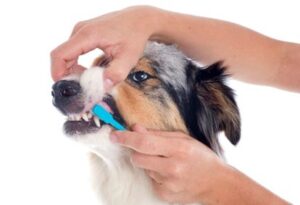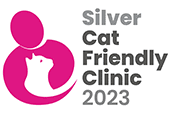Brushing is by far the best method of keeping your pet’s teeth clean and is more successful if taken in stages. Ideally, it would help if you brushed your dog’s teeth at least once daily or three times at a minimum to help remove plaque and prevent tartar build-up.
STAGE 1: Build confidence
- Smaller pets can be placed at a comfortable working height where they feel secure, on a chair, table or lap covered with a towel to prevent slipping.
- For cats it can be easier if there are two people, and for larger pets, it may be best to leave them on the floor.
- Gently rub the face and muzzle with fingers and hands only. Work up to being able to hold the mouth closed for a short period gently. This can be done by placing fingers on top of the nose, or muzzle, with the thumb under the chin.
- Do this for approximately 30 seconds and then reward with a fuss, play, a treat, or all the above.
- Repeat daily for at least five days or until your pet is relaxed and comfortable with this.
STAGE 2: Finger brushing
- You must use a pet-specific toothpaste and place your pet in the building confidence position.
- Gently close the mouth as practised. The lips will be relaxed, so there is no need to try and hold the mouth open.
- Apply a small amount of toothpaste to a fingertip or finger toothbrush and slide under the lip to rub the paste onto the teeth.
- Start from the canine (fang teeth) and work backwards.
- Many pets find the incisors (small teeth at the front of the mouth) very sensitive, so only brush these once your pet has become used to the other teeth being brushed.
STAGE 3: Moving on to a toothbrush
- Once your pet is happy with the finger brushing, you can progress on to a toothbrush. A toothbrush specifically designed for both dogs and cats are best.
- Place the toothpaste onto the brush and slide under the gum with the finger brush and gently brush the teeth.
- If you are right-handed, it is easier to brush the left side of your pet’s mouth. We recommend working hard at ensuring that both sides of the mouth are equally brushed. This may mean starting on the side that you feel least comfortable brushing.
- When you start brushing, you may notice a small amount of blood on the toothbrush. As you continue to brush this will stop appearing as you will be tackling the gum disease responsible for the bleeding. If it does not stop, please come and see your dental team or vet.
ADVANCED LEVEL
Consider the gums
If you find the brushing easy and your pet is very tolerant, consider that it is not just the teeth you can brush but also the gums. To do this, you will need to look carefully at which teeth you are brushing. Angle the toothbrush so that the bristles gently clean the gum around the base of each tooth. This is advanced level brushing and only to be attempted if you and your pet are comfortable and confident to do so.
In addition to brushing, the following can also help keep teeth and gums healthy…
GELS
Gel products are beneficial for pets that suffer from or are likely to develop gum disease. Gels can also be beneficial for cats where brushing is not tolerated as they can be applied with a cotton bud and may allow progression to a toothbrush.
ORAL RINSES
Oral rinses are especially useful if gums are too sore to brush, especially immediately after dental treatment. Both gels and oral rinses are to be used daily.
SPECIALIST DIETS
Some brands of pet food offer a range that are specifically designed to be kind to your pet’s teeth and can be used in conjunction with brushing. The biscuit size, shape and texture is formulated to provide an increased abrasive action. Please speak to us to find out which diet would be the most suitable for your pet.
DENTAL CHEWS
Dental chews may help to reduce plaque accumulation and tartar formation on teeth, and pets love the taste. However, it is important to not rely on them completely as evidence indicates that chews alone are not capable of maintaining long term oral health.






